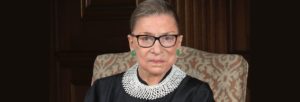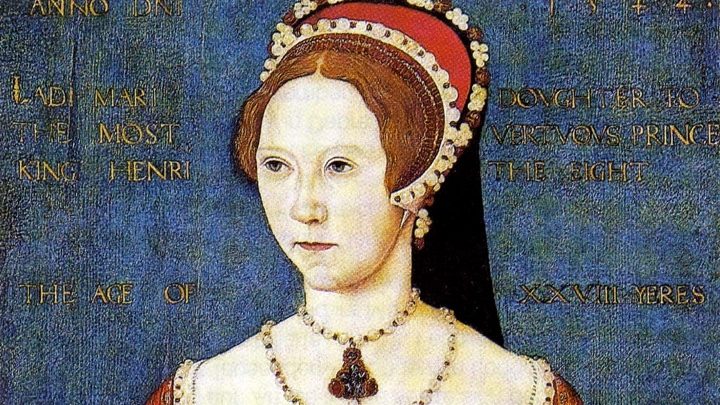
But this performance (besides the excellent cast—Michael Chioldi, Ellie Dehn, Hillary Ginther) offered the additional inducement of almost an hour’s music that had been cut before the world premiere in 1883. Something similar was true last year, with the concert that opened the all-Gounod (bicentennial) season of his much-snipped grand opera La Reine de Saba.
Boston has got used, over seven years, to such an opening from Odyssey: an unfamiliar enormous grand opera (full chorus and orchestra, large cast). The excitement of the event sweeps apprehension aside. The performance, at the New England Conservatory’s Jordan Hall, began at 7:30 and ran past midnight.
“Audiences don’t have the staying power they used to have!” laments company maestro Gil Rose. “We’ve had this tradition of opening, in September, with a concert opera, and it kind of opens the whole concert season in Boston. There have been two kinds of reaction, two kinds of people: The ones who love it, who are here. And there are others who just do not want to be inside a theater that long. They’ve been trained towards the ninety-minute opera..
“But there are rewards delivered by staying through a long listen. There’s a quartet at the end of Henry VIII that is, I think, the most beautiful and sophisticated thing Saint-Saëns ever wrote. But it follows a ten-minute aria. And you’re in hour four by that point. So you’ve got to be in it for the haul.”
Odyssey kicked off in 2013 with Wagner’s Rienzi, a performance starry-eyed music-lovers still talk about. Other seasons have commenced with Die Töte Stadt (in a year of late romantics), Die Aegyptische Helena (in a year devoted to operas about Helen of Troy), Tchaikovsky’s The Maid of Orleans (in a year of Joan of Arc operas) and Gounod’s La Reine de Saba.
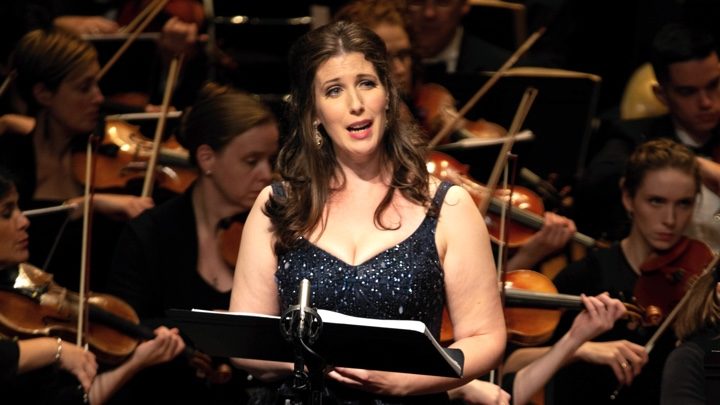
Ellie Dehn in Henry VIII.
“Audiences are hungry to hear works they don’t know and experience the full range of what the operatic medium has to offer. Odyssey Opera provides just that,” Rose maintains.
This year, the “theme” is the Tudor dynasty which, considering its brevity (118 years, five monarchs—six, if you count Lady Jane Grey, the subject of an Odyssey world premiere this spring), has inspired an awful lot of dramatic art, including theater, opera, movies and TV. The Tudors had brains, personality and iconic looks. What else matters? Except that religion and politics are seldom central to opera. Love motivates song, and traditional love plots are rare in the Tudor story. Fiction must be added to the mix.
Pacini’s Maria, rRgina d’Inghilterra, about the flirtations of Bloody Mary will be followed by Rossini’s Elisabetta, Regina d’Inghilterra (about Elizabeth and Leicester), Benjamin Britten’s Gloriana (Elizabeth and Essex), and Edward German’s Merrie England, an operetta about Elizabeth and Raleigh composed by one of Arthur Sullivan’s protegés.
Conspicuous by their absence: Donizetti’s four “Tudor” tragedies—because everybody knows them now. When I began going to opera, nobody knew them. Someone has to start the ball rolling.
Maestro Rose remarks, “I try to find audiences for works that don’t have them, to explore operas that were important or valuable but hadn’t been heard recently, if at all. At the same time I wanted to create a hook that would bring people in.” Thus the “thematic” choice of repertory.
Beyond that, the Odyssey repertory ranges widely over the centuries of opera. Helen of Troy inspired works from Gluck to Offenbach, Joan of Arc inspired Verdi and Norman Dello Joio, Oscar Wilde brought in Zemlinsky, Strauss and Lowell Lieberman.
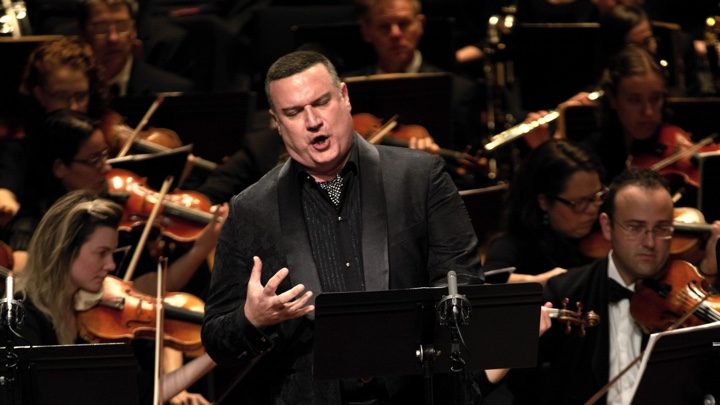
Michael Chioldi in Henry VIII.
“Something will pique my interest,” Rose explains. “Some years ago I was listening to Mario Castelnuovo-Tedesco’s symphonic music and he seemed to have all the trademarks of a great twentieth-century opera composer. So I wondered if he’d written any. And he had, though none were well-known. And his last one was a setting of The Importance of Being Earnest. I wondered what on earth that could be like! I discovered this very odd but charming piece. Then I wondered what other operas besides Salome had been based on Oscar Wilde’s writings. I soon had a whole season planned called ‘Wilde Opera Nights’.”
“Building an audience for unknown repertoire is not simple, but the appeal is growing.” This goes along with Rose’s other creation, the Boston Modern Orchestra Project, which is about to celebrate twenty-five years of playing orchestral repertory of the last one hundred years.
“So our window keeps moving. We play new pieces, mid-century pieces, late-century pieces, and we’re doing a lot of recording on our own label, which now boasts about seventy commercial recordings. We’ve been recording with Odyssey, too; we’re about to release our third, The Importance of Being Earnest. The first two [Mascagni’s Zanetto and three one-act operas by Dominick Argento] were undeservedly unknown. It makes a difference if we get the word out.
“Our season normally starts with one opera, maybe two with a commonality, and then I start looking for things to fill in the blanks. I was interested in Saint-Saëns’ Henry VIII. I’d always wondered why that opera wasn’t a bigger deal. I listened to it, and it sort of fell flat. But not if you put the right pieces back in. Our audience was as interested at the end of the fourth act as they were at the end of the first.
“With operas like that, it’s like a stool with one leg missing if you cut too much, and the wrong things. They originally cut about half the third act—the whole scene between the papal legate and Henry before the trial happens. Without that, they segue right to the trial and nobody knows what it’s about. It made the opera work. Because it was a down moment before the big up moment, so if you include it, the up moment is twice as up.”
Next weekend, on Friday night and on Sunday afternoon, Odyssey will present staged performances at the Huntington Avenue Theatre of Giovanni Pacini’s bel canto rarity, Maria, Regina d’Inghilterra. “In Boston there’s really no venue that can stage a grand opera,” Rose regrets.
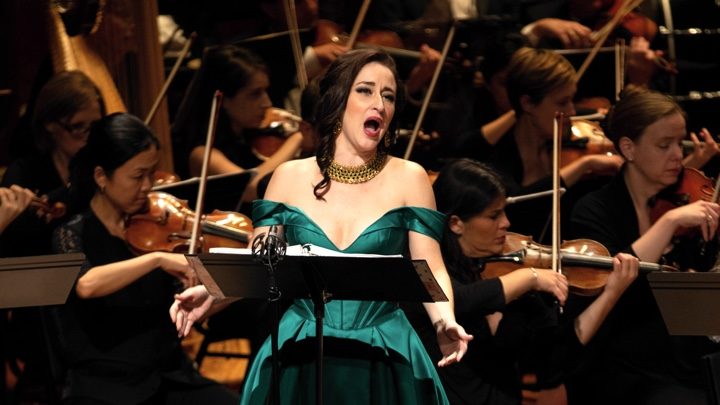
Hillary Ginther in Henry VIII.
“There’s the old opera house where Sarah Caldwell did things, but it’s always got a touring Broadway show or something in it. So if it’s a big work like Henry VIII or Britten’s Gloriana, it becomes a concert performance. If it’s medium-sized, like Gounod’s Le médecin malgré lui, we stage it.”
Maria d’Inghilterra was a hit in 1843 in Palermo, though in a few years it faded from the repertoire. But Pacini could always toss off another opera if some company wanted a world premiere—he turned out seventy operas in his long, melodious career.
Pacini was much celebrated in his own lifetime, or at least the 1820s and 1840s, his busiest decades. He had an impressive tuneful felicity, first for comic numbers to be inserted in the operas presented by his family, who were traveling players. But by the time he was 22, he was writing operas, mostly in the style of Rossini—“It was the popular style of the time,” he grumbled later. “Nobody wanted anything else.” (He is the only bel canto composer to have left us memoirs of the time.) Rossini was only three years older than Pacini, but his operas were acclaimed around the world.
When Rossini moved to Paris in 1823, Pacini captured the field with L’Ultimo giorno di Pompeii and Gli Arabi nelle Gallie, among other extravaganzas. But he had a rival in Saverio Mercadante, and soon after that Nicola Vaccai, the brothers Ricci, Donizetti and Bellini. Rossini deplored Pacini’s casual habits: “If he studied music, he’d be better than any of us.”
Pacini’s melodies, designed to suit the virtuoso singers of the day, were delicious (all of them wrote such melodies), and he was especially famed for his cabalettas and his stretti, the thrilling, all-voices-at-once run-up to the end of an act. (Maria d’Inghilterra has one or two of them.)
But Bellini’s endless, elaborating melodies were the quintessence of romantic melodrama and Donizetti developed a swift-paced dramatic thrust from studying good plays and building his scenes upon them. Pacini did not keep up with that side of stage requirement.
In 1835, Pacini gave up the opera stage. He became a professor in musical academies and a composer of church music on demand. But then Bellini died and Donizetti was lured north of the Alps, to Paris and Vienna. After 1840, Pacini got his second wind. He tossed Rossini’s model aside and was competing with Donizetti and Mercadante.
To this era belong Pacini’s best-known work, Saffo, and also Maria Regina d’Inghilterra, Bondelmonte and Stella di Napoli—even an attempt at Medea. But though his compositional style matured, Pacini was still inclined to accept libretti as written, where Donizetti pushed for tighter dramas.
And then there was the new kid on the block, Verdi, whose psychological pathos and riveting dramatic melody drove everyone else from the field.
“Maria d’Inghilterra is a musical hybrid,” says Gil Rose. “It starts from Rossini and the next scene is Bellini, the next from Verdi, the next from Donizetti. He’s got Italian romantic opera covered. He writes in a much more chromatic language than some of his contemporaries—certainly more than Donizetti and Bellini. He’s got Bellini’s gift of finding the tune and staying with it. And he has a sense of the drama.
“Maria is not a short work but it hasn’t got a lot of down time. It goes by quickly and all the numbers have dramatic meaning, are crucial to the plot. In that sense he’s like Verdi—he doesn’t waste time.
“We have had discussions about interpreting what everybody should be thinking at the moment. Certainly he was very free with the facts. It’s a beautiful piece of historical fiction! The other day we were having a deep conversation during rehearsal about motivation, and I said: Your motivation is E-flat Major.
“With other composers, who have survived—like Zandonai or Mascagni—there’s some marquee piece that keeps their name alive, that makes people want to explore other parts of their output. But Pacini left nothing that remained famous. People only know Maria because of that Opera Rara revival.
“There is better bel canto singing now than there was twenty-five years ago, especially among young singers. There seems to be a revival of the technique. Some people go to opera companies that do the same twenty operas over and over, but other people are looking for more—for something different. The Early Music movement comes out of that desire. The popularity of new music, of new operas. I think people are looking for more than the big 20.
“I wish the leaders of more opera companies would stick their necks out a bit, program less familiar things, give audiences a chance. If they’ve become used to the same menu over and over again, you can’t blame them for wanting the same menu over and over—you’ve self-selected the people who will want that. It’s a bad cycle; it’s a downward-spinning cycle. I’ve been trying to do my part to break it. But it’s not an easy road, swimming uphill against the trend. Or in the symphonic world—it’s even worse in the symphonic world.
“I’ve never conducted Aida. I’ve got nothing against it, but I know how it ends. I know how it begins, too. And the middle.” (I thought: Gounod’s La Reine de Saba was just like Aida—but different.) “Also, with La Reine de Saba and with Henry VIII, there’s all this music that has never been heard—that was cut from the first.
“The thing about cuts—you can always tell who’s at the top of the organizational triangle—is it the composer? The director? The artistic director? Someone has to give me a reason for the cut, whether it’s vocally taxing or there’s an awkward scene change—there has to be some reason to cut. But the standard has become the opposite: ‘What’s the reason to keep this music in? It’s normally cut, isn’t it?’ And I’m: Ye-es, but I’m not about to second-guess Mozart or Verdi on what works in the theater. If they wanted it performed, they had their reasons.”
All of this is music to my ears, and I’ve been visiting Boston for Odyssey’s performances for years now. The music is memorable and memorably performed, the casting is choice. You get to rely on a company—and a director—like this! It will never produce the same old thing. They will always give you something you haven’t heard—and that something will be worth hearing.

